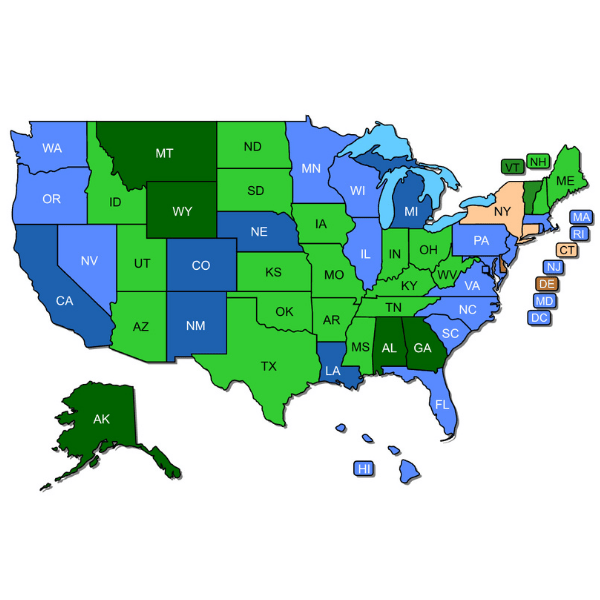CCW Courses and Tips, CCW Training
Understanding Concealed Carry Reciprocity: Where Is Your Permit Valid?
At Cloudster Pillow, we understand the importance of staying informed about concealed carry reciprocity laws for responsible gun owners.
Navigating the complex web of state-specific regulations can be challenging, especially when traveling across state lines.
This guide will help you understand where your concealed carry permit is valid and how to stay compliant with local laws.
What Is Concealed Carry Reciprocity?
Definition and Importance
Concealed carry reciprocity refers to a legal agreement between states that allows a person with a valid concealed carry permit from one state to legally carry a concealed firearm in another state. This concept holds significant importance for CCW permit holders who travel across state lines. Understanding reciprocity is not just a matter of convenience-it’s a legal necessity. Carrying a concealed weapon in a state that doesn’t recognize your permit can result in serious legal consequences (including fines and jail time).
The Complex Patchwork of State Laws
The United States lacks a unified federal law governing concealed carry permits. Instead, we have a complex patchwork of state laws and agreements. Some states have universal reciprocity, recognizing all out-of-state permits. Others have limited reciprocity, only recognizing permits from specific states. A few states (like California and New York) don’t recognize any out-of-state permits at all.
Staying Informed and Compliant
State laws change frequently, so staying informed about reciprocity agreements is an ongoing responsibility for CCW permit holders. The U.S. Concealed Carry Association (USCCA) reports that over 860,000 people rely on their resources for up-to-date information on gun laws and reciprocity. We recommend using reputable online resources and mobile apps that provide real-time updates on reciprocity laws. These tools can help you plan your travel routes and ensure you always carry legally.
The Push for National Reciprocity
There’s an ongoing push for national concealed carry reciprocity. The Constitutional Concealed Carry Reciprocity Act, introduced on January 15, 2025, aims to allow gun owners with concealed carry privileges in their home states to exercise those rights in other states that allow concealed carry while abiding by local laws. However, until such legislation passes, CCW permit holders must navigate the current state-by-state system.
Tools for Navigating Reciprocity
Several tools exist to help CCW permit holders navigate the complex world of reciprocity. The USCCA provides a comprehensive Gun Laws and Reciprocity Map, which is regularly updated to reflect changes in state laws. Other organizations (such as the National Rifle Association) also offer similar resources. These tools prove invaluable for responsible gun owners who want to ensure they comply with local laws while traveling.
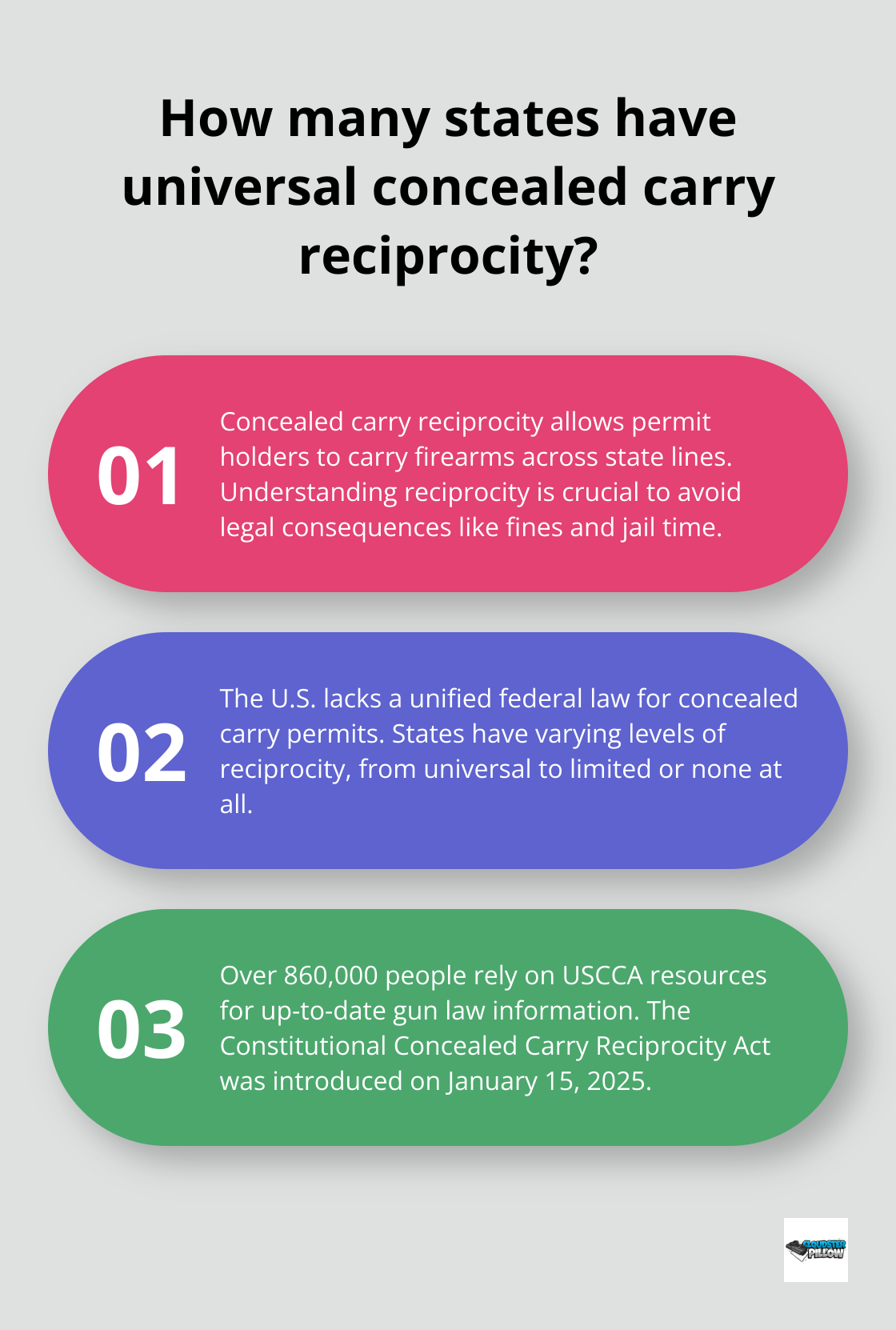
As we move forward, let’s examine the states that offer universal reciprocity and what that means for CCW permit holders.
Which States Offer Universal Reciprocity?
The Holy Grail for CCW Holders
Universal reciprocity states represent the pinnacle for concealed carry permit holders. These states recognize all other states’ permits, which simplifies travel for CCW holders. Check your concealed carry permit(s) reciprocity and learn about every state’s concealed carry and gun laws.
Advantages of Universal Reciprocity
Universal reciprocity provides several benefits for CCW permit holders. It eliminates the need to worry about crossing state lines or consulting complex reciprocity maps. This peace of mind proves invaluable, especially for those who travel frequently for work or leisure.
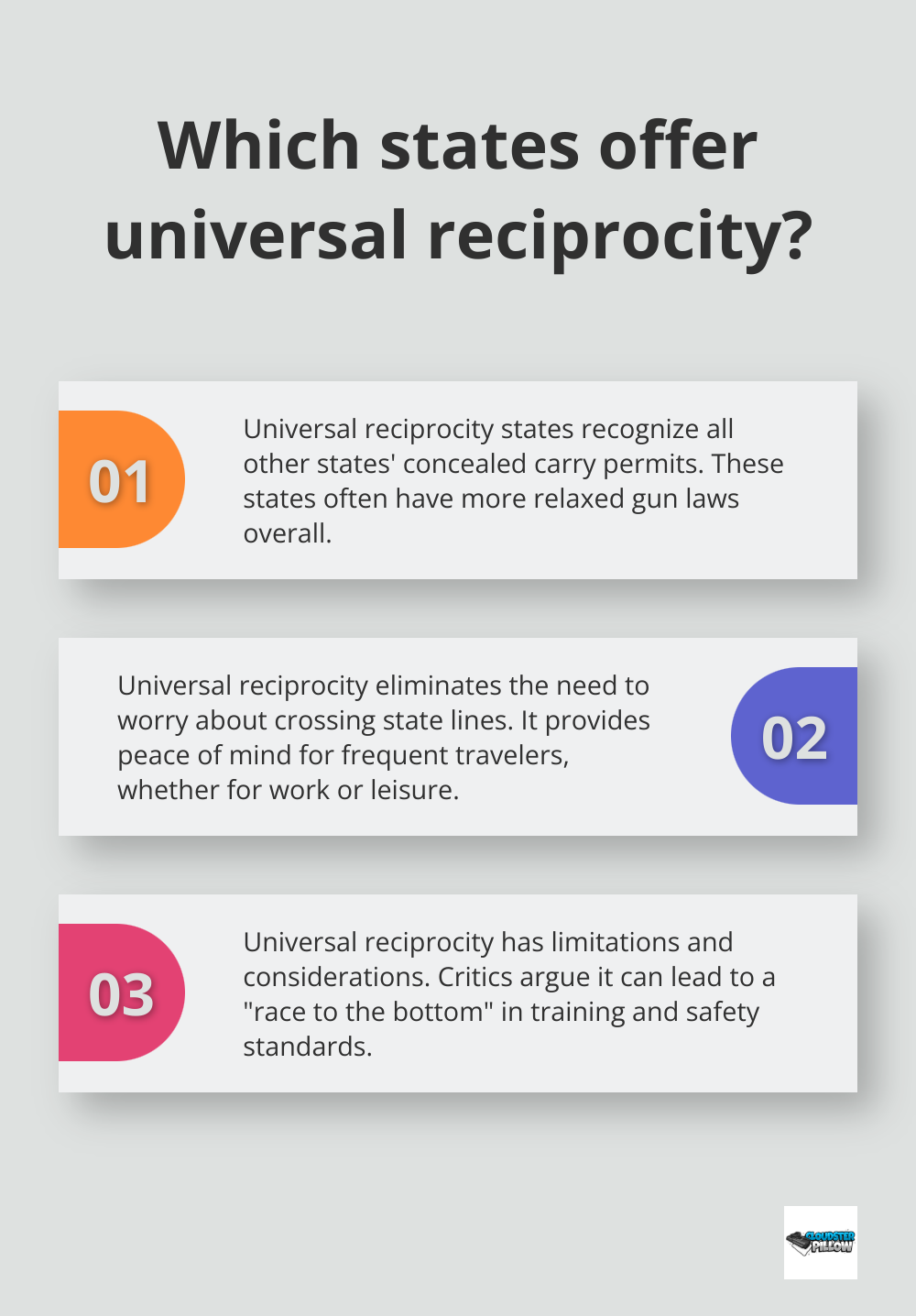
States with universal reciprocity often have more relaxed gun laws overall. This reduces the risk of accidentally violating a local ordinance. For example, Arizona (one of the most gun-friendly states) allows carry in most public places without concern.
Limitations and Considerations
Despite its advantages, universal reciprocity has its drawbacks. Critics argue it can lead to a “race to the bottom” in terms of training and safety standards. A permit from a state with minimal requirements receives the same treatment as one from a state with rigorous training mandates.
It’s important to note that “universal” doesn’t mean “unlimited.” Even these states impose restrictions. Many universal reciprocity states prohibit carrying in certain locations (such as schools, government buildings, and bars). In Tennessee, for instance, carrying in parks or playgrounds where children are present is not allowed.
Staying Informed in a Changing Landscape
The landscape of concealed carry laws changes rapidly. We recommend checking the specific laws of your destination state before every trip (even if it’s a universal reciprocity state). This practice ensures compliance and avoids potential legal issues.
Comfort Matters: Enhancing Your Carry Experience
For those who carry in universal reciprocity states, comfort becomes a key consideration. Traditional holsters can cause discomfort, especially during extended wear. Innovative solutions like holster wedges address this issue by providing a minimalist design with maximum comfort. This not only increases comfort but also improves concealment by reducing printing.
As we explore the complexities of concealed carry reciprocity, it’s clear that universal reciprocity states offer significant advantages. However, the landscape of limited reciprocity agreements adds another layer of complexity for CCW holders to navigate.
Navigating Limited Reciprocity States
Understanding Limited Reciprocity Agreements
Limited reciprocity agreements complicate concealed carry across state lines. These agreements recognize permits from specific states, but not all. This patchwork of recognition creates challenges for CCW holders who travel between states.
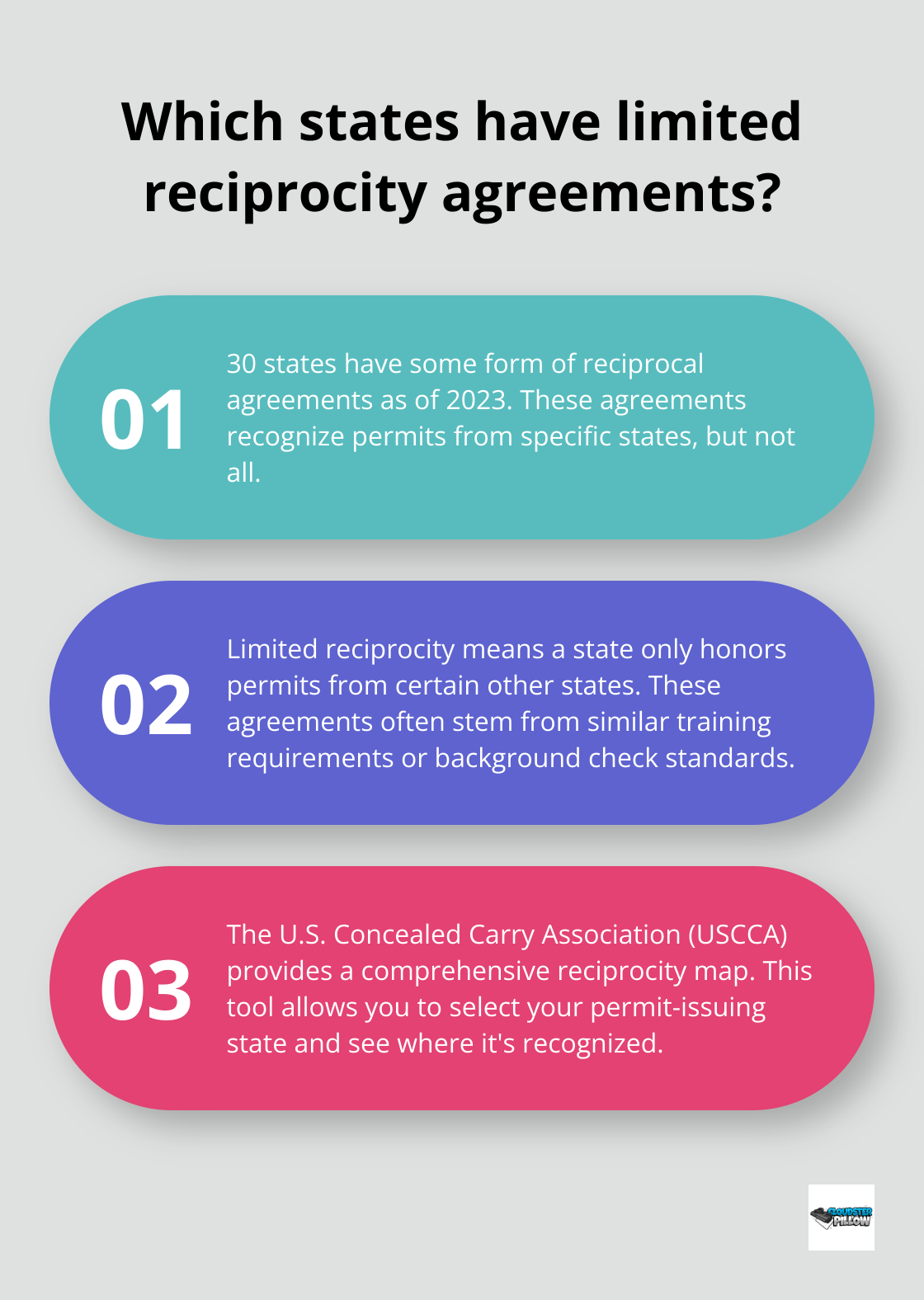
Limited reciprocity means a state only honors permits from certain other states. These agreements often stem from similar training requirements or background check standards between states.
The National Rifle Association reports that as of 2023, 30 states have some form of reciprocal agreements. However, these agreements change rapidly.
Determining Permit Validity
Checking your permit’s validity in limited reciprocity states requires diligence. The U.S. Concealed Carry Association (USCCA) provides a comprehensive reciprocity map, which updates regularly. This tool allows you to select your permit-issuing state and see where it’s recognized.
Another practical approach involves contacting the state’s attorney general’s office or law enforcement agency directly. They provide the most up-to-date information on reciprocity agreements.
Practical Tips for Limited Reciprocity Travel
When you travel through limited reciprocity states, consider these strategies:
- Plan your route carefully, avoid states that don’t recognize your permit.
- Carry a physical copy of relevant state laws and reciprocity agreements.
- Consider obtaining non-resident permits from states with broad recognition.
The Florida Department of Agriculture and Consumer Services issues non-resident permits recognized in numerous states (making it a popular choice for frequent travelers).
The Impact of Training Requirements
Training standards significantly influence reciprocity agreements. States with stringent training requirements often only recognize permits from states with similar standards.
Some states offer widely recognized permits due to their comprehensive training programs. Obtaining a non-resident permit from such states can expand your carry options significantly.
Comfort Considerations for Limited Reciprocity Travel
When traveling through states with limited reciprocity, comfort becomes a key factor (especially during long trips). Traditional holsters can cause discomfort, leading to fatigue and decreased awareness. The Cloudster Pillow offers a solution, providing a soft cushion between the holster and body. This innovative design enhances comfort without compromising concealment, making it an ideal choice for travelers navigating complex reciprocity laws.
FAQs
What is concealed carry reciprocity?
Concealed carry reciprocity is an agreement between states allowing a person with a valid concealed carry permit from one state to legally carry in another. These agreements vary widely, so it’s important to check each state’s laws before traveling.
Do all states recognize out-of-state concealed carry permits?
No. Some states have universal reciprocity, recognizing all out-of-state permits, while others have limited reciprocity or no recognition at all. States like California and New York do not honor any permits issued elsewhere.
How can I check if my concealed carry permit is valid in another state?
You can use tools like the USCCA’s Gun Laws and Reciprocity Map or contact the attorney general’s office in the state you plan to visit. Laws change frequently, so verify before every trip.
What’s the difference between universal and limited reciprocity?
Universal reciprocity means a state recognizes permits from every other state. Limited reciprocity means it only recognizes permits from select states, often based on similar training or background check requirements.
Do reciprocity laws override local firearm restrictions?
No. Even if your permit is valid in a state, local laws still apply. You may still face restrictions on carrying in certain places like schools, government buildings, or private businesses.
Final Thoughts
Concealed carry reciprocity laws require constant vigilance from responsible gun owners who travel across state lines. The USCCA’s Gun Laws and Reciprocity Map and similar tools provide real-time updates on permit validity, enabling confident travel planning. Local laws and restrictions apply even in states with universal reciprocity, so research your destination’s specific regulations before you travel.
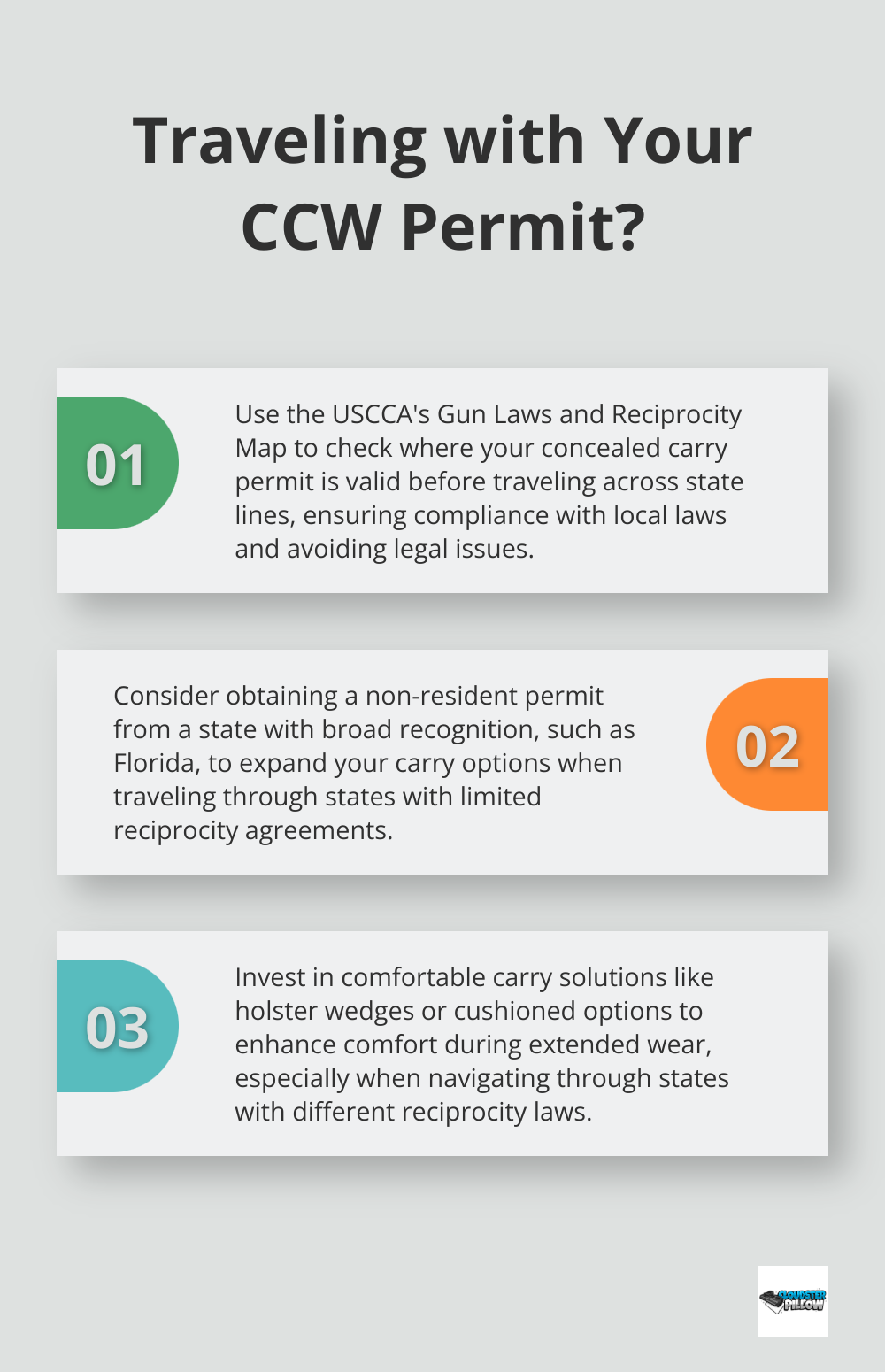
Comfort matters for those who frequently navigate states with limited reciprocity. The Cloudster Pillow enhances comfort and concealment for various holster types during extended wear. Its design uses adjustable shredded cooling gel memory foam to prevent heat buildup and irritation.
Responsible gun ownership transcends understanding reciprocity laws. It demands continuous education, regular training, and an unwavering commitment to safety. You can confidently exercise your right to carry while respecting the diverse legal landscape across the United States if you stay informed, use the right equipment, and follow local laws.

